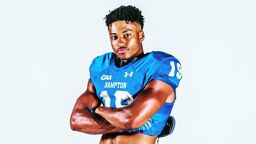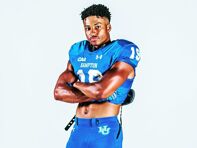It’s an iconic USA Paralympics image.
Stephanie Wheeler, after winning her second straight women’s wheelchair basketball Paralympics gold medal as a player, grabbed an American flag and hoisted is above her shoulders.
Wheeler has since elevated herself to legendary status. She coached Team USA to gold at the Rio Paralympics in 2016. Over the years she has also coached the Illinois women’s wheelchair basketball team. She is also a member of the National Wheelchair Basketball Hall of Fame.
Get off the sidelines and into the game
Our weekly newsletter is packed with everything from locker room chatter to pressing LGBTQ sports issues.
Wheeler is also featured in Outsports’ docuseries, “Ballin’ Out.” In the series, she invites the audience into not just her coaching world, but also her personal life as an out lesbian.
We caught with Wheeler to talk about her career, as well as the “Ballin’ Out” series.
OUTSPORTS: Let’s start with the reason we’re here: “Ballin’ Out.” What are your thoughts on the series?
STEPHANIE WHEELER: I love it. I think the storytelling is really beautiful. Such care was taken with all of our stories. Everyone who had the opportunity to tell their story. Such care was taken with how those stories were portrayed, in letting us take the lead in how we wanted to be seen and heard.
I love the documentary series. You get this mix of beautiful storytelling, and this super ultra competitive look at our sport. It’s hard to do that in 65 minutes, but [director] Michiel Thomas did a beautiful job that’s compelling and draws you in.
People have told me you’ll laugh, you’ll cry. It”s unique. These stories haven’t been told. And it’s very timely.
OUTSPORTS: When we embarked on this project over two years ago, you talked about making sure this project didn’t become “Inspiration Porn.” Tell us about that, and also, did we succeed?
WHEELER: One of the things that’s easy to slide into when we’re telling stories about folks who are disabled is that disabled people are objectified to make other people feel better. It exploits disabled folks in that process.
Why this project is not that is that: We get to tell our stories. it’s our words and our experiences. By letting that happen, Michiel avoids getting into the water of “inspiration porn.”
The series is inspirational. It will inspire people to try for the national team, or that they can be a woman and disabled and queer. But we got to have a say in how that story is told.
The docuseries is obviously aimed at a mass audience, but it’s not there to make you feel pity or sad. It’s not there to objectify us. It tells our stories, and it tells our whole stories.
The other reason it avoids that, is thgat it shows us in all of our complexities. This series shows our emotions, it shows our different experiences, it shows we’re complex, complicated individuals living with disabilities.
OUTSPORTS: How do you see Team USA’s chances in Women’s Wheelchair Basketball at the Paris Paralympics?
WHEELER: This team competing at the Paralympics has every opportunity to win a gold medal. Thinking about teams that are successful, they have speed, they have the ability to score in different ways, they can defend, they have veteran leadership and young players who might be on the verge of changing the game, and they have great coaching. This team has everything it needs to go win a gold medal.
They’ve also experienced a lot over the last three years. In the docuseries you’ll see their journey at the 2023 World Championships. This team has grown so much and they are ready, they are ready for this moment.
We have a long history of greatness with USA Wheelchair Basketball. From our first teams to this team right now. we have gold medals, and we have great people. We’ve won four gold medals at the Paralympics.
That’s a legacy we can be proud to be part of, and I hope this team knows all of the teams before them have their back, to lift them up.
OUTSPORTS: You’ve accomplished everything someone could in the sport. What is your present, and what is your future, in women’s wheelchair basketball?
WHEELER: As the head coach at the University of Illinois, I get to work with some of the athletes who have aspirations to compete on Team USA. And I get to work with other athletes whose highest aspiration is the collegiate level. I get to help them all achieve their hopes and dreams. And I never take that for granted.
Outside of coaching, my goal is to make sure all of the women in our sport feel they belong for what they bring to the sport, and for who they are. That includes some amazing coaches.
I’ll continue to do everything I can to ensure our sport is a place where everyone feels they belong.
OUTSPORTS: A couple years ago you resigned as a member of the Board of Directors for the National Wheelchair Basketball Association, when they declined to remove Trooper Johnson as the head coach of the women’s team. He has since resigned. Would you return to that position at some point in the future?
WHEELER: I resigned because i felt our female athletes were not being heard and were not being taken seriously. I didn’t want to be part of a leadership team that didn’t listen to or believe women, and I wanted to show our athletes I believed them. That was very important to me. So after a lot of contemplation, that was the right thing to do for me and my values, and because our athletes deserved to be believed.
And no, I will not return to the board of directors.
OUTSPORTS: If you could point viewers to a couple key takeaways from the BALLIN’ OUT series, what would they be?
WHEELER: Disabled people are complicated and complex, just like every other human being. We have lives where we experience ranges of emotions. We have joy. We’ve all gone through things that have changed the trajectory of our lives. We experience love. We experience the full range of emotions of humanity. And I hope people see that. Joy. Love. Heartbreak. Tragedy.
I also want everyone to see how amazing our sport is. And how unbelievably athletic and talented our athletes and coaches are. And to see them as competitors, and the amazing Paralympians they are.
I hope they can now see that disability isn’t limiting, it’s ableism in society that’s limiting. And I hope it helps shift that lens and inspire people to see where ableism exists in society and help everyone be whatever they want to be.









































